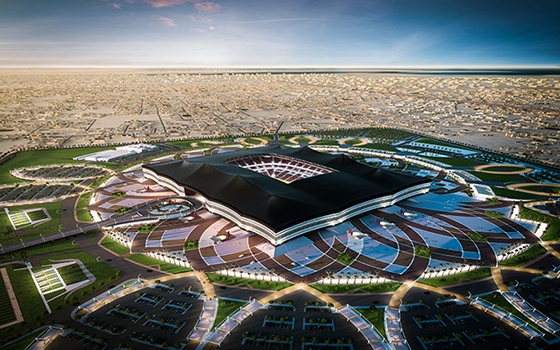A scaled model of 60,000-seat Al Bayt Stadium and Precinct, proposed semi-final venue for the 2022 World Cup, to be built in Al Khor. For Qatar, the 2022 World Cup provides a useful focal point to complete the required infrastructure and move to the next growth phase, according to a QNB report.
Qatar is likely to be an economic winner from the World Cup unlike Brazil, where economic activity during the 2014 FIFA World Cup was as dismal as the performance of its national team, according to QNB.
Qatar can draw useful lessons from the experience of countries and cities which hosted major sporting events, QNB said in a latest report.
Qatar’s economy has now entered a new diversification phase driven by large infrastructure spending and rapid population growth in preparation for the 2022 World Cup, it said.
This phase is just an interim milestone in the larger vision of establishing a knowledge-based economy as set out in the Qatar National Vision 2030, it said; adding in this sense, hosting the World Cup is a means to achieving a longer-term goal of modernizing the Qatari economy.
Highlighting that for a knowledge-based economy to flourish, the right physical and human capital are needed, QNB said the 2022 FIFA World Cup provides a useful focal point to complete the required infrastructure and move to the next growth phase and also helps promote Qatar to the world and attract a growing number of skilled workers.
“In this respect, Qatar is likely to be an economic winner from the World Cup,” the country’s largest bank said.
On the recently concluded 2014 World Cup, QNB said available indicators of Brazil’s economic activity during the tournament are as dismal as was the performance of its national team.
Observing that as several Brazilian host cities shut down on the days when matches were played, economic activity fell across the country. As a result, industrial production declined, capacity utilization fell to near-record lows and inventories soared, the QNB report said.
Judging by these short-term indicators, one may conclude that “the World Cup was an economic failure”, it said.
“A longer-term perspective, however, is needed to judge the economic merits of hosting a major sporting event. This perspective could provide useful lessons for Qatar, where the 2022 World Cup will take place,” QNB said.
The long-term perspective starts years before the actual event itself, it said, adding hosting the World Cup requires major investments, not only in sporting facilities but also in general infrastructure such as roads, transportation network, hotels and services.
These investments provide a major economic boost for many years with higher GDP growth. They also generate significant employment opportunities, which the host nation can fill either with their national population or by attracting a large wave of expatriates. Either way, the resulting increase in income provides a second-round boost to growth, according to QNB.
Gulf Times
17 August

























































